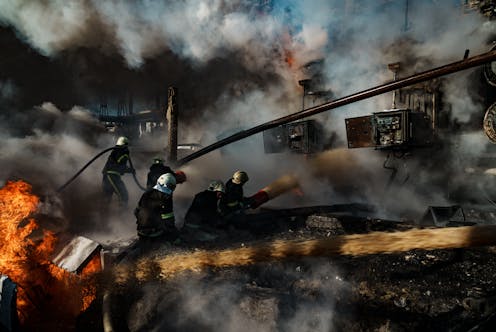Crippling civilian infrastructure has long been part of Russian generals' playbook – Putin is merely expanding that approach
- Written by Benjamin Jensen, Professor of Strategic Studies, Marine Corps University; Scholar-in-Residence, American University, American University School of International Service
 Ukrainian firefighters battling flames at a power station hit by Russian missiles.Serhii Mykhalchuk/Global Images Ukraine via Getty Images
Ukrainian firefighters battling flames at a power station hit by Russian missiles.Serhii Mykhalchuk/Global Images Ukraine via Getty ImagesIn response to massive battlefield setbacks, Russia has increased its attacks in Ukraine on everything from power plantsand damsto railways, pipelinesand ports.
These attacks against civilian infrastructure are...

